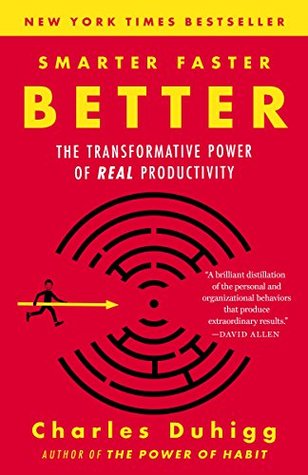More on this book
Community
Kindle Notes & Highlights
Read between
April 14 - April 15, 2020
Productivity, put simply, is the name we give our attempts to figure out the best uses of our energy, intellect, and time as we try to seize the most meaningful rewards with the least wasted effort.
Rather, productivity is about making certain choices in certain ways. The way we choose to see ourselves and frame daily decisions; the stories we tell ourselves, and the easy goals we ignore; the sense of community we build among teammates; the creative cultures we establish as leaders: These are the things that separate the merely busy from the genuinely productive.
Motivation is more like a skill, akin to reading or writing, that can be learned and honed. Scientists have found that people can get better at self-motivation if they practice the right way. The trick, researchers say, is realizing that a prerequisite to motivation is believing we have authority over our actions and surroundings. To motivate ourselves, we must feel like we are in control.
When people believe they are in control, they tend to work harder and push themselves more. They are, on average, more confident and overcome setbacks faster. People who believe they have authority over themselves often live longer than their peers. This instinct for control is so central to how our brains develop that infants, once they learn to feed themselves, will resist adults’ attempts at control even if submission is more likely to get food into their mouths.
“Animals and humans demonstrate a preference for choice over non-choice, even when that choice confers no additional reward,”
The first step in creating drive is giving people opportunities to make choices that provide them with a sense of autonomy and self-determination.
This is a useful lesson for anyone hoping to motivate themselves or others, because it suggests an easy method for triggering the will to act: Find a choice, almost any choice, that allows you to exert control.
Motivation is triggered by making choices that demonstrate to ourselves that we are in control.
people with an internal locus of control tend to praise or blame themselves for success or failure, rather than assigning responsibility to things outside their influence.
We praise people for doing things that are hard. That’s how they learn to believe they can do them.”
If you can link something hard to a choice you care about, it makes the task easier, Quintanilla’s drill instructors had told him. That’s why they asked each other questions starting with “why.” Make a chore into a meaningful decision, and self-motivation will emerge.
If you give people an opportunity to feel a sense of control and let them practice making choices, they can learn to exert willpower.
Once people know how to make self-directed choices into a habit, motivation becomes more automatic.
“It’s the difference between making decisions that prove to yourself that you’re still in charge of your life, versus falling into a mindset where you’re just waiting to die,”
An internal locus of control emerges when we develop a mental habit of transforming chores into meaningful choices, when we assert that we have authority over our lives.
He got another job, but the lack of camaraderie among his colleagues was disappointing. No one seemed motivated to excel. So in 2015, he reenlisted. “I missed that constant reminder that I can do anything,” he told me. “I missed people pushing me to choose a better me.”
We should reward initiative, congratulate people for self-motivation, celebrate when an infant wants to feed herself. We should applaud a child who shows defiant, self-righteous stubbornness and reward a student who finds a way to get things done by working around the rules.
That’s when self-motivation flourishes: when we realize that replying to an email or helping a coworker, on its own, might be relatively unimportant. But it is part of a bigger project that we believe in, that we want to achieve, that we have chosen to do. Self-motivation, in other words, is a choice we make because it is part of something bigger and more emotionally rewarding than the immediate task that needs doing. In


